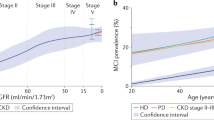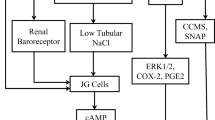Abstract
Objective
Previous research indicates a link between cognitive impairment and chronic kidney disease (CKD), but the underlying factors are not fully understood. This study aimed to investigate the progression of CKD-induced cognitive impairment and the involvement of cognition-related proteins by developing early- and late-stage CKD models in Sprague-Dawley rats.
Methods
The Morris water maze test and the step-down passive avoidance task were performed to evaluate the cognitive abilities of the rats at 24 weeks after surgery. Histopathologic examinations were conducted to examine renal and hippocampal damage. Real-time PCR, Western blotting analysis, and immunohistochemical staining were carried out to determine the hippocampal expression of brain-derived neurotrophic factor (BDNF), choline acetyltransferase (ChAT), and synaptophysin (SYP).
Results
Compared with the control rats, the rats with early-stage CKD exhibited mild renal damage, while those with late-stage CKD showed significantly increased serum creatinine levels as well as apparent renal and brain damage. The rats with early-stage CKD also demonstrated significantly impaired learning abilities and memory compared with the control rats, with further deterioration observed in the rats with late-stage CKD. Additionally, we observed a significant downregulation of cognition-related proteins in the hippocampus of rats with early-stage CKD, which was further exacerbated with declining renal function as well as worsening brain and renal damage in rats with late-stage CKD.
Conclusion
These results suggest the importance of early screening to identify CKD-induced cognitive dysfunction promptly. In addition, the downregulation of cognition-related proteins may play a role in the progression of cognitive dysfunction.
Similar content being viewed by others
References
Vaidya SR, Aeddula NR. Chronic Renal Failure. Treasure Island; StatPears Publishing, 2021.
Webster AC, Nagler EV, Morton RL, et al. Chronic Kidney Disease. Lancet, 2017,389(10075):1238–1252
Kurella Tamura M, Yaffe K, Hsu CY, et al. Cognitive Impairment and Progression of CKD. Am J Kidney Dis, 2016,68(1):77–83
Rodríguez-Angarita CE, Sanabria-Arenas RM, Vargas-Jaramillo JD, et al. Cognitive impairment and depression in a population of patients with chronic kidney disease in Colombia: a prevalence study. Can J Kidney Health Dis, 2016,3:26
Sarnak MJ, Tighiouart H, Scott TM, et al. Frequency of and risk factors for poor cognitive performance in hemodialysis patients. Neurology, 2013,80(5):471–480
Bugnicourt JM, Godefroy O, Chillon JM, et al. Cognitive disorders and dementia in CKD: the neglected kidney-brain axis. J Am Soc Nephrol, 2013,24(3):353–363
Murray AM. Cognitive impairment in the aging dialysis and chronic kidney disease populations: an occult burden. Adv Chronic Kidney Dis, 2008,15(2):123–132
Bronas UG, Puzantian H, Hannan M. Cognitive Impairment in Chronic Kidney Disease: Vascular Milieu and the Potential Therapeutic Role of Exercise. Biomed Res Int, 2017,2017:2726369
Foster R, Walker S, Brar R, et al. Cognitive Impairment in Advanced Chronic Kidney Disease: The Canadian Frailty Observation and Interventions Trial. Am J Nephrol, 2016,44(6):473–480
Pusswald G, Tropper E, Kryspin-Exner I, et al. Health-Related Quality of Life in Patients with Subjective Cognitive Decline and Mild Cognitive Impairment and its Relation to Activities of Daily Living. J Alzheimers Dis, 2015,47(2):479–486
Thancharoen O, Waleekhachonloet O, Limwattananon C, et al. Cognitive impairment, quality of life and healthcare utilization in patients with chronic kidney disease stages 3 to 5. Nephrology (Carlton), 2020,25(8):625–633
Yaffe K, Peltz CB, Ewing SK, et al. Long-term Cognitive Trajectories and Mortality in Older Women. J Gerontol A Biol Sci Med Sci, 2016,71(8):1074–1080
Sanon Aigbogun M, Oberdhan D, Doane MJ, et al. Disconnect in Assessments of Autosomal Dominant Polycystic Kidney Disease Burden Between Patients and Physicians: A Survey Study. Int J Nephrol Renovasc Dis, 2021,14:105–115
Szerlip HM, Edwards ML, Williams BJ, et al. Association Between Cognitive Impairment and Chronic Kidney Disease in Mexican Americans. J Am Geriatr Soc, 2015,63(10):2023–2028
Torres RV, Elias MF, Seliger S, et al. Risk for cognitive impairment across 22 measures of cognitive ability in early-stage chronic kidney disease. Nephrol Dial Transplant, 2017,32(2):299–306
Yeh YC, Huang MF, Liang SS, et al. Indoxyl sulfate, not p-cresyl sulfate, is associated with cognitive impairment in early-stage chronic kidney disease. Neurotoxicology, 2016,53148–152
Zammit AR, Katz MJ, Zimmerman ME, et al. Low eGFR is associated with dysexecutive and amnestic mild cognitive impairment. Alzheimers Dement (Amst), 2015,1(2):152–159
Lu B, Nagappan G, Lu Y. BDNF and synaptic plasticity, cognitive function, and dysfunction. Handb Exp Pharmacol, 2014,220:223–250
Nonomura T, Hatanaka H. Neurotrophic effect of brain-derived neurotrophic factor on basal forebrain cholinergic neurons in culture from postnatal rats. Neurosci Res, 1992,14(3):226–233
Sala R, Viegi A, Rossi FM, et al. Nerve growth factor and brain-derived neurotrophic factor increase neurotransmitter release in the rat visual cortex. Eur J Neurosci, 1998,10(6):2185–2191
Jamal M, Ito A, Tanaka N, et al. The Role of Apolipoprotein E and Ethanol Exposure in Age-Related Changes in Choline Acetyltransferase and Brain-Derived Neurotrophic Factor Expression in the Mouse Hippocampus. J Mol Neurosci, 2018,65(1):84–92
Poirel O, Mella S, Videau C, et al. Moderate decline in select synaptic markers in the prefrontal cortex (BA9) of patients with Alzheimer’s disease at various cognitive stages. Sci Rep, 2018,8(1):938
Watanabe K, Fujii H, Goto S, et al. Newly Developed Rat Model of Chronic Kidney Disease-Mineral Bone Disorder. J Atheroscler Thromb, 2018,25(2):170–177
Miskowiak KW, Vinberg M, Macoveanu J, et al. Effects of Erythropoietin on Hippocampal Volume and Memory in Mood Disorders. Biol Psychiatry, 2015,78(4):270–277
Ko IG, Kim CJ, Kim H. Treadmill exercise improves memory by up-regulating dopamine and down-regulating D(2) dopamine receptor in traumatic brain injury rats. J Exerc Rehabil, 2019,15(4):504–511
Moore JF, Sharer JD. Methods for Quantitative Creatinine Determination. Curr Protoc Hum Genet, 2017,93:A.3O.1–A.3O.7
Voss JL, Bridge DJ, Cohen NJ, et al. A Closer Look at the Hippocampus and Memory. Trends Cogn Sci, 2017,21(8):577–588
Etgen T, Sander D, Chonchol M, et al. Chronic kidney disease is associated with incident cognitive impairment in the elderly: the INVADE study. Nephrol Dial Transplant, 2009,24(10):3144–3150
Gounden V, Bhatt H, Jialal I. Renal Function Tests. StatPearls. Treasure Island (FL) ineligible companies. Disclosure: Harshil Bhatt declares no relevant financial relationships with ineligible companies. Disclosure: Ishwarlal Jialal declares no relevant financial relationships with ineligible companies.: StatPearls Publishing Copyright © 2023, StatPearls Publishing LLC.; 2023.
Burns CM, Knopman DS, Tupper DE, et al. Prevalence and Risk of Severe Cognitive Impairment in Advanced Chronic Kidney Disease. J Gerontol A Biol Sci Med Sci, 2018,73(3):393–399
Ciesielska N, Sokołowski R, Mazur E, et al. Is the Montreal Cognitive Assessment (MoCA) test better suited than the Mini-Mental State Examination (MMSE) in mild cognitive impairment (MCI) detection among people aged over 60? Meta-analysis. Psychiatr Pol, 2016,50(5):1039–1052
Olsen RK, Sebanayagam V, Lee Y, et al. The relationship between eye movements and subsequent recognition: Evidence from individual differences and amnesia. Cortex, 2016,85:182–193
Voss JL, Gonsalves BD, Federmeier KD, et al. Hippocampal brain-network coordination during volitional exploratory behavior enhances learning. Nat Neurosci, 2011,14(1):115–120
Yee LT, Warren DE, Voss JL, et al. The hippocampus uses information just encountered to guide efficient ongoing behavior. Hippocampus, 2014,24(2):154–164
Kurajoh M, Kadoya M, Morimoto A, et al. Plasma brain-derived neurotrophic factor concentration is a predictor of chronic kidney disease in patients with cardiovascular risk factors - Hyogo Sleep Cardio-Autonomic Atherosclerosis study. PLoS One, 2017,12(6):e0178686
Nakahashi T, Fujimura H, Altar CA, et al. Vascular endothelial cells synthesize and secrete brain-derived neurotrophic factor. FEBS Lett, 2000,470(2):113–117
Sartorius A, Hellweg R, Litzke J, et al. Correlations and discrepancies between serum and brain tissue levels of neurotrophins after electroconvulsive treatment in rats. Pharmacopsychiatry, 2009,42(6):270–276
Chu S, Gu J, Feng L, et al. Ginsenoside Rg5 improves cognitive dysfunction and beta-amyloid deposition in STZ-induced memory impaired rats via attenuating neuroinflammatory responses. Int Immunopharmacol, 2014,19(2):317–326
Reeta KH, Singh D, Gupta YK. Edaravone attenuates intracerebroventricular streptozotocin-induced cognitive impairment in rats. Eur J Neurosci, 2017,45(7):987–997
Bulloch K, Damavandy T, Badamchian M. Characterization of choline O-acetyltransferase (ChAT) in the BALB/C mouse spleen. Int J Neurosci, 1994,76(1–2):141–149
Ho YS, Lau CF, Lee K, et al. Impact of unilateral ureteral obstruction on cognition and neurodegeneration. Brain Res Bull, 2021,169112–169127
Liang C, Tan S, Huang Q, et al. Pratensein ameliorates β-amyloid-induced cognitive impairment in rats via reducing oxidative damage and restoring synapse and BDNF levels. Neurosci Lett, 2015,59248–59253
Chen T, Wu Y, Wang Y, et al. Brain-Derived Neurotrophic Factor Increases Synaptic Protein Levels via the MAPK/Erk Signaling Pathway and Nrf2/Trx Axis Following the Transplantation of Neural Stem Cells in a Rat Model of Traumatic Brain Injury. Neurochem Res, 2017,42(11):3073–3083
Ye Q, Zeng C, Luo C, et al. Ferrostatin-1 mitigates cognitive impairment of epileptic rats by inhibiting P38 MAPK activation. Epilepsy Behav, 2020,103(Pt A):106670
Zhang CY, He FF, Su H, et al. Association between chronic kidney disease and Alzheimer’s disease: an update. Metab Brain Dis, 2020,35(6):883–894
Xie Z, Tong S, Chu X, et al. Chronic Kidney Disease and Cognitive Impairment: The Kidney-Brain Axis. Kidney Dis (Basel), 2022,8(4):275–285
Oh YS, Kim JS, Park JW, et al. Arterial stiffness and impaired renal function in patients with Alzheimer’s disease. Neurol Sci, 2016,37(3):451–457
Miglinas M, Cesniene U, Janusaite MM, et al. Cerebrovascular disease and cognition in chronic kidney disease patients. Front Cardiovasc Med, 2020,7:96
Viggiano D, Wagner CA, Martino G, et al. Mechanisms of cognitive dysfunction in CKD. Nat Rev Nephrol, 2020,16(8):452–469
Wu Y, Shang Y, Sun SG, et al. Protective effect of erythropoietin against 1-methyl-4-phenylpyridinium-induced neurodegenaration in PC12 cells. Neurosci Bull, 2007,23(3):156–164
Maurice T, Mustafa MH, Desrumaux C, et al. Intranasal formulation of erythropoietin (EPO) showed potent protective activity against amyloid toxicity in the Aβ 25–35 non-transgenic mouse model of Alzheimer’s disease. J Psychopharmacol, 2013,27(11):1044–1057
Rodriguez Cruz Y, Strehaiano M, Rodriguez Obaya T, et al. An intranasal formulation of erythropoietin(Neuro-EPO) prevents memory deficits and amyloid toxicity in the APPSwe transgenic mouse model of Alzheimer’s disease. J Alzheimers Dis, 2017,55(1):231–248
Mohamed AR, Soliman GY, Ismail CA, et al. Neuroprotective role of vitamin D3 in colchicine-induced Alzheimer’s disease in rats. Alexandr J Med, 2014,51(2):127–136
Llewellyn DJ, Langa KM, Lang IA. Serum 25-hydroxyvitamin D Concentration and cognitive impairment. J Geriatr Psychiatry Neurol, 2009,22(3): 188–195
Hensel N, Schön A, Konen T, et al. Fibroblast growth factor 23 signaling in hippocampal cells: impact on neuronal morphology and synaptic density. J Neurochem, 2016,137(5):756–769
Drew DA, Weiner DE. Cognitive impairment in chronic kidney disease: keep vascular disease in mind. Kidney Int, 2014,85(3):505–507
de Donato A, Buonincontri V, Borriello G, et al. The Dopamine System: Insights between Kidney and Brain. Kidney Blood Press Res, 2022,47(8):493–505
Reza-Zaldívar EE, Sandoval-Avila S, Gutiérrez-Mercado YK, et al. Human recombinant erythropoietin reduces sensorimotor dysfunction and cognitive impairment in rat models of chronic kidney disease. Neurologia (Engl Ed), 2020,35(3):147–154
Li G, Zhao M, Cheng X, et al. FG-4592 Improves Depressive-Like Behaviors through HIF-1-Mediated Neurogenesis and Synapse Plasticity in Rats. Neurotherapeutics, 2020,17(2):664–675
Author information
Authors and Affiliations
Corresponding author
Ethics declarations
The authors declare that they have no conflicts of interest.
Additional information
This study was funded by the Youth Fund of the Shanghai Municipal Health Commission (No. 20164Y0266).
Rights and permissions
About this article
Cite this article
Wang, Y., Chen, K., Qiao, Zx. et al. Chronic Kidney Disease Induces Cognitive Impairment in the Early Stage. CURR MED SCI 43, 988–997 (2023). https://doi.org/10.1007/s11596-023-2783-9
Received:
Accepted:
Published:
Issue Date:
DOI: https://doi.org/10.1007/s11596-023-2783-9




